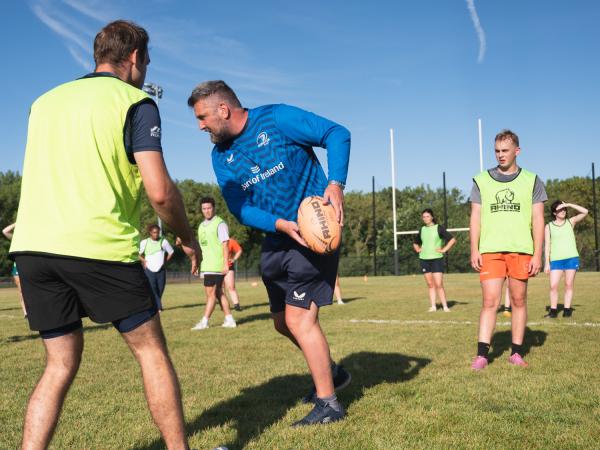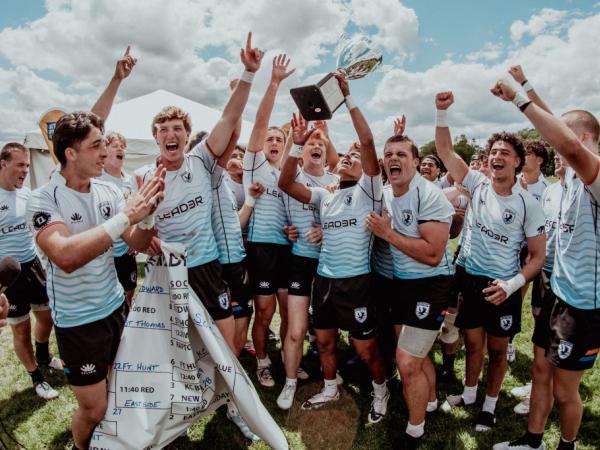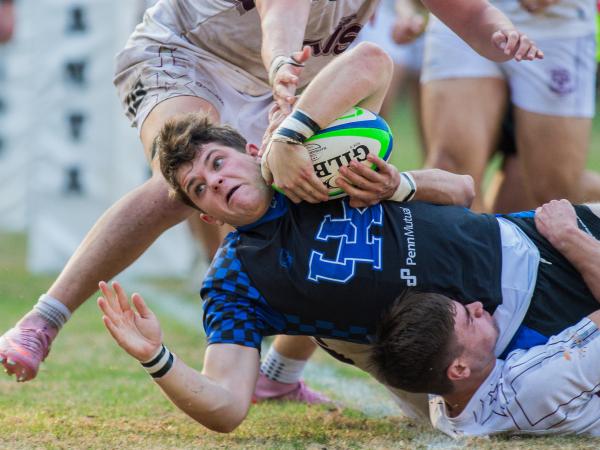Somebody I respect asked me recently what the big deal was about the British & Irish Lions tours, and I found that my answer rambled on way too long - not a big surprise when you’re talking to a rugby journalist and history major who went to school in Britain.
But ponder the long answer got me thinking. Why did I, jaded as I can be and someone who doesn’t always bend over backwards to see every international rugby game, make time to see the British Lions games? Why did this quadrennial series deserve attention at all?
It is about history, really, and part of that is rugby history. The Lions tours predate the airplane and mass communications, for one thing. Rugby was a spot loved and played with devotion in Britain, South Africa, and New Zealand - countries that were very far from each other. It’s not like any player of that nation got to see the others very often, so the grand event of getting on a ship and traveling for weeks to play some rugby games (often for several months each time) was something worth noticing.
You go it a few times, and soon you have something of a tradition.
That tradition has survived two world wars, depressions, rationing, and professionalism to still be grand rugby theater. And why that is, I suppose, is because we do have to recognize that rugby union is not, actually, the dominant sport in England, Scotland, or Ireland. (You can argue it’s the #1 sport in Wales, but I suspect if I bothered to look at the stats, soccer would win in participation numbers.) So while these national teams can win the odd World Cup or major series, there seems to be that need to say “we’ll get all the best guys from up here, and we’ll go to your country where you’re rugby-mad, and we’ll just see who’s the best.”
Even when rugby tours have been cast aside in favor of various cups and championships, the idea that you put an all-star team together, make them become a unit, and fight to the death (figuratively speaking), carries weight. The idea that the people of the Home Countries go out to the Colonies and show them what’s what has something to do with it, too. This rivalry is somehow ingrained in the history of the nations involved, and maybe that’s why it’s so compelling.
A Little History (Just a Little)
The first British Lions tour was in 1891 to South Africa, and was a resounding victory for the Lions (all three test matches were shutouts). Five years later the Lions returned to the Veldt and won 3 games to 1. And then in 1899, the Lions toured Australia, winning 3-1.
This was a time when rugby was very much an amateur sport. The countries the Lions were touring were still putting themselves together in some ways. The South Africa of 1891 and 1896 was in between two rather brutal wars between the British Empire and the Boers (rural Afrikaaners). You could read some effort at keeping everything British and on an even-keel in the holding of those first two tours.
The Lions kept up the tours through 1910, finally playing New Zealand in 1904 (in a one-off after sweeping Australia), and then getting thumped 0-2-1 in 1908.
The tours were halted during World War I, of course, but returned in the 1920s. Up to World War II you saw a trend in the tours - the hosts started getting their organization together ands started winning, and New Zealand began to be a bigger stage than Australia. From 1891-1904 the Lions won four series and tied one, going a total of 13-4-1. From 1908-1938, they Lions were 0-5 in series and won 3 games while losing 13 and tying 2. What you saw there was the growth of the sport of rugby as a cultural touchstone in South Africa and New Zealand, the growth of rugby league and Aussie rules making Australia a bit of an afterthought, and some stagnation in British rugby in terms of how they trained for and prepared for these types of games.
Post-War
The Post-War period is, for me, 1950-1968. It is during that time that both South Africa and New Zealand were in a period of great strength, and while Wales in the mid-1950s was pretty good, too, overall the Lions struggled. I think this is because rugby in Britain was still aggressively public school (what we Americans call private school), amateur, and still a little slap-dash in its organization.
For example, there was no club championship. Some purists even refused to acknowledge the Home Championship (what became the 5 Nations and then the 6 Nations) as anything more than a series of friendlies.
South Africa, by contract, started playing the Currie Cup in the 19th Century. New Zealand’s system of challenge trophies was a little different, but still put a greater value on winning.
In South Africa and New Zealand, rugby players were public school kids, of course, but they were also lumberjacks, farmers, and police officers. They were hardened men, and played like it.
So it was that from 1950-68 the Lions toured played nine series (if we include Australia games as separate series), going 3-6-1 in the series. All three series wins were 2-0 versus Australia on a tour where the Lions lost to New Zealand. Overall, the Lions won 9, lost 18, and tied 3, going 6-0 against Australia and 3-18-3 against New Zealand and South Africa. The best performance was in 1955, when the Lions, led by the excellent Cliff Morgan, weathered two big losses and won two close ones to tie the series 2-2.
Modern Times
Then there was a change. The change partly came because the Baby Boomers were now reaching adulthood. With a little better nutrition and a commitment (in Wales especially) toward physical education as a proper subject in school, some special athletes began to emerge.
The other thing that changed? Coaching. Believe it or not, the British Lions didn’t really tour with a coach, per se, until 1971. They had a manager, who made sure everything came together and who was part of the selection panel, and they had a captain, whose job it was to address the tactical aspects of the games.
(There’s the famous story of the captain in 1899 dropping himself from the team after the Lions lost to Australia, and then the Lions won three straight.)
But in 1971, Carwyn James came on as the “assistant” to manager Doug Smith. James, with John Dawes as captain (one of the captains who could probably have been a pretty good coach), ushered in a new, more professional approach to the tour.
Sure, they still had their fun, but this revolutionary idea of having a coach made much of the difference. And while this wasn’t the best All Blacks team in 1971 (they were sort of in between strong periods), the Lions won the series, 2-1-1. Three years later, pretty much the same team crushed the Springboks 3-0-1.
After that it wasn’t quite the same, as the retirements of some of the great players, and the stress of touring every three years on athletes who had day jobs took its toll. The 1977 team in New Zealand didn’t have all the best players, but was still a Grant Batty interception away from a tied series.
In 1989, Australia was the main destination for the first time since 1904.
From 1971 through 1993, the Lions won 3 series and lost 4. Six of the seven series were very close, with controversial calls and plays, and a bit of luck one way or the other (Australia lost the 1989 series 2 games to 1, with the decider being 19-18).
This was also the time when the frequency of the tours changed. Public anger over apartheid prevented the Lions from returning to South Africa after 1980, and as a result there was a six-year game between two of the tours. With the Rugby World Cup starting up in 1987, that gap allowed everyone to conclude that every four years, two years after the World Cup, made more sense.
The Professional Era
Once rugby went professional, tours started to go by the wayside. Pro clubs, after all, now had a reason to demand their players stay home and play for their club. International games became more about an annual trophy.
So it was with some concern about the future of Lions that they toured South Africa in 1997. But the fan following showed that the tours had some legs, and the Lions won 2-1 to show they could still hang in there, even against the defending World Cup champs. Four years later the Lions lost a close series to Australia, and then hit the rocks against New Zealand. That was 2005, and the All Blacks crushed the Lions with more athleticism, more adventure, and better team chemistry. It was a brutal education for Lions team management, as they learned that dividing your team between starters and reserves doesn’t make for one big happy family. And also, if you’re touring in the pro era, you better have the athletic good to back it up.
From the ashes of 2005 came three thrilling series. In 2009 the Lions lost twice by razor-thin margins and then won the third game by 19. In 2013 they split two games by razor-thin margins and then ran away with the decider.
And then we come to this year, where the All Blacks looked the better side in Game One, were largely outplayed in Game Two, and the third game ended in a somewhat controversial tie.
The upshot is this. In the professional era, every tour except that of 2005 has been really close. The Lions have won 2 series, lost three, and tied one. Their overall record is 7-10-1. Eight of the games have been decided by a try or less. Only three games were decided by more than 20. As a spectacle, as drama, as a series of competitive games, the British & Irish Lions tours have hung in there, and delivered.
Final Notes: The call to red card Sonny Bill Williams was the right call in Game Two, given how referees now have to adjudicate the contact area. The call not to give a penalty offside at the end of Game Three is more problematic, and probably calls into question when it’s penalty offside. I have seen too many of those calls go against the USA to like it when a ball lands in a player’s hands. That’s not, in my mind, playing the ball. If you see the ball and go get it, you’re actively committing an offside act. It lands in your chest and you reflexively grab it, it shouldn’t be a penalty, especially given that the offending player had no way of knowing whether the ball was knocked on or not.
However, former All Black Justin Marshall’s question as to whether that call would have been the same in the 1st minute in a valid one. I, personally, would not want that to have been a penalty at any time, but that’s not how referees have been refereeing it.
I would like to see refs say “you’re offside, release the ball” or something and play on. We have to many inconsistencies in the game’s laws still. This was one. Ultimately I wasn’t happy with how New Zealand Kieran Read advanced on and towered over Romain Poite in a somewhat intimidating manner. If I had been Poite I might have started thinking about a penalty the other way to just tell him to shove off. But Poite stayed cool, and stayed cool all the way through. He made probably the right call, and the ending was probably the right one.
(P.S. Read was offside on that kickoff. And also, the All Blacks got a scrum from that play and had the opportunity to win the game with a drop goal and didn't do it.)
British & Irish Lions Tours Overview
Early Years
Tours: 7
BL Series Record: 4-2-1
BL Won-Loss Record: 14-8-2
Notes: New Zealand played only 4 games, BL going 0-3-1
Between Wars
Tours: 3
BL Series Record: 0-3
BL Won-Loss Record: 2-9-1
Notes: Not really close
Post-War
Tours: 9
Bl Series Record: 3-6-1
BL Won-Loss Record: 9-18-3
Notes: 6-0 v Australia (we’re counting two-game series v. Australia as a separate series from same-year series v. New Zealand). Period 1950-1968
Early Modern Era
Tours: 7
Bl Series Record: 3-4
BL Won-Loss Record: 10-14-2
Notes: Five of these series were really, really close, with a tight game or two the deciding factors. Only 1974 v South Africa (Lions won), and 1983 v New Zealand (All Blacks won) were lopsided series wins.
Professional Era
Tours: 6
Bl Series Record: 2-3-1
BL Won-Loss Record: 7-10-1
Notes: Did you know that Jeremy Guscott made the series-winning score in two Lions tours, 1989 and 1997? Four of these series were exceedingly close. One was kind of lopsided (Lions over Australia in 2013), and one was very lopsided (2005 All Blacks over Lions)


































































